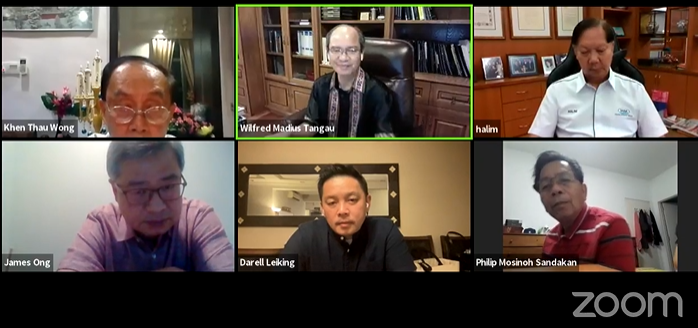
Clockwise from top left: Wong, Tangau, Halim, Leiking (bottom row, centre) and Ong during the webinar.
KOTA KINABALU: Sabah industries should be given compensation or a fair deal, such as income tax exemption, as the cabotage policy has contributed substantially to the cost of doing business here in Kota Kinabalu.
Sabah Skills and Technology Centre (SSTC) chairman Datuk Seri Panglima Wong Khen Thau said the cabotage policy was aimed at encouraging the growth of the shipping industry, which was fair, but it was implemented at the expense of the industries in Sabah.
He said industries in Sabah used to contribute more than 30 percent to the State’s Gross Domestic Product (GDP) but the figure has now dropped to 7.2 percent.
“Industries in Sabah are not growing.
“The growth of the shipping industry against the industries in Sabah is not a fair game,” he said during a webinar on ‘The Malaysian Cabotage Policy: Addressing the Concern of Sabahans’ organized by Wisdom Foundation here on Monday.
To maintain the cabotage policy, Wong said the government should think of ways to assist industries in Sabah. In Australia, for example, the central government subsidizes a price equalization programme to make sure the prices of goods in Tasmania is the same as that on the mainland, he said.
Hence, he proposed Sabah industries be given income tax exemption for at least 30 years.
“What I am suggesting is that compensation or a fair deal should be accorded to Sabahans or Sarawakians,” he said.
Wong, who is also the chairman of Malaysian International Chamber of Commerce and Industry (MICCI) Sabah branch and honorary life president of the Federation of Sabah Industries (FSI), said the cabotage policy should be looked at from two aspects, namely the cost of doing business in Sabah, which impacted the growth of industries in the State, and livelihood of the people owing to higher cost of goods.
He said the cabotage policy did contribute substantially to the cost of doing business in Sabah, particularly when industry players imported goods from Peninsular Malaysia.
For instance, he said the cost of shipping a 40-foot container to Kota Kinabalu was over RM7,500, including around RM5,000 for freight charges alone. Meanwhile, he said a 20-foot container cost RM5,200 to reach Kota Kinabalu, including RM3,000 for freight.
He said local shipping companies also imposed other charges such as bunkers surcharge and bunkers recovery surcharge, while international lines only charged one price.
Wong continued to say that the cabotage policy was not the sole culprit contributing to the higher price of goods in Sabah.
He said some business owners were equally to blame for maintaining their prices when the policy was liberalized.
He said any national policies should benefit the majority of rakyat in Sabah and the whole nation, as opposed to benefitting one industry.
He said the cabotage policy was introduced unilaterally 41 years ago in June 1980 without discussions with Sabah and Sarawak to understand the circumstances in East Malaysia.
“Industry players in Sabah hope that the national policies designed for national development should be well balanced and enjoyed by people in Peninsular Malaysia, Sabah and Sarawak.”
He said lawmakers ought to bear in mind that Sabah was lagging 20 to 30 years behind Peninsular Malaysia.
He said the cost of doing business was very high in Sabah whereas the price of goods here was 10 to 20 percent higher than that of West Malaysia.
“So the question is, what is the catch up plan?
“Whatever plan or policy designed by the Federal Government should be a balanced one,” he stressed.
Wong continued to say that the lack of load to fill up containers in Sabah was a chicken and egg situation.
He said the government should invest on the infrastructure and facilities in Sabah before they expected the industries to grow.
“It is quite impossible for industries to grow when we are being choked to the level where we cannot breathe.”
On another note, he said industry players have been promoting Sepanggar port as a transshipment hub for the Indochina and Brunei-Indonesia-Malaysia-Philippines East Asean Growth Area (BIMP-EAGA) region.
“We should be looking into promoting the ports in Sabah.
“I am sure one day we will reverse the cabotage policy where goods from China will come to Sabah first then to Peninsular Malaysia.
“People in Peninsular will have a taste of what cabotage policy is then.”
The webinar, moderated by Wisdom Foundation executive chairman Datuk Seri Panglima Wilfred Madius Tangau, featured Malaysia External Trade Development Corporation (Matrade) chairman Tan Sri Dr Halim Mohammad as key speaker, Wong, former minister of international trade and industry Datuk Darell Leiking and Malaysia Shipowners’ Association (MASA) exco member James Ong as panelists.
The post Call for ‘compensation’ for Sabah industries over cabotage policy appeared first on Borneo Post Online.


